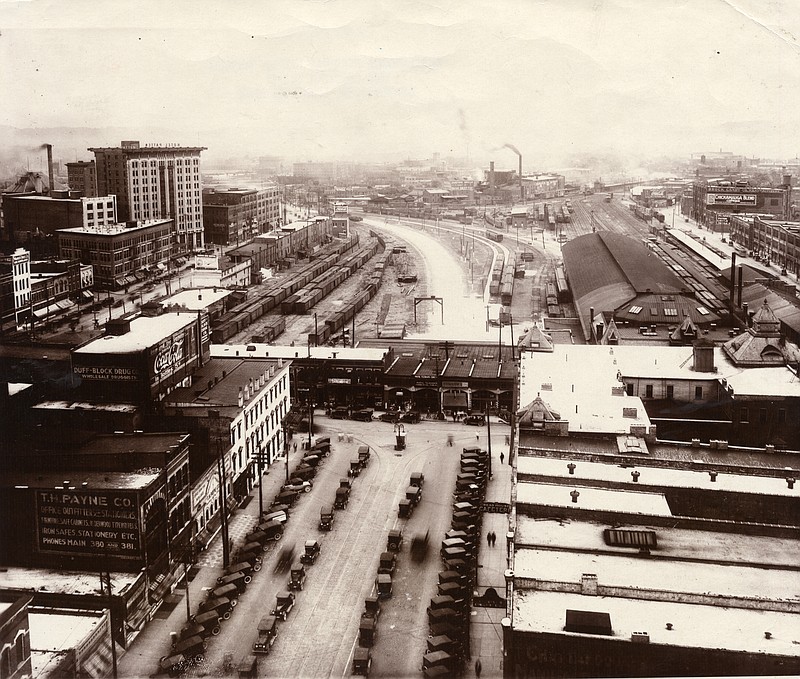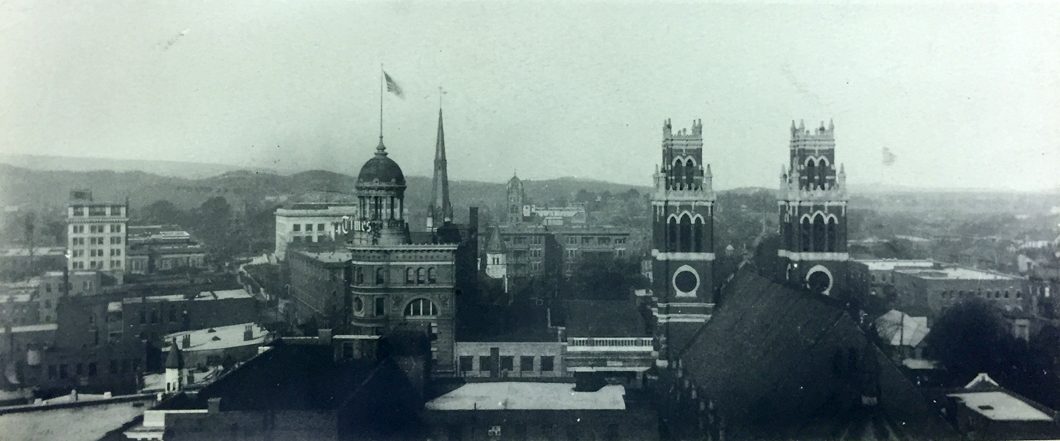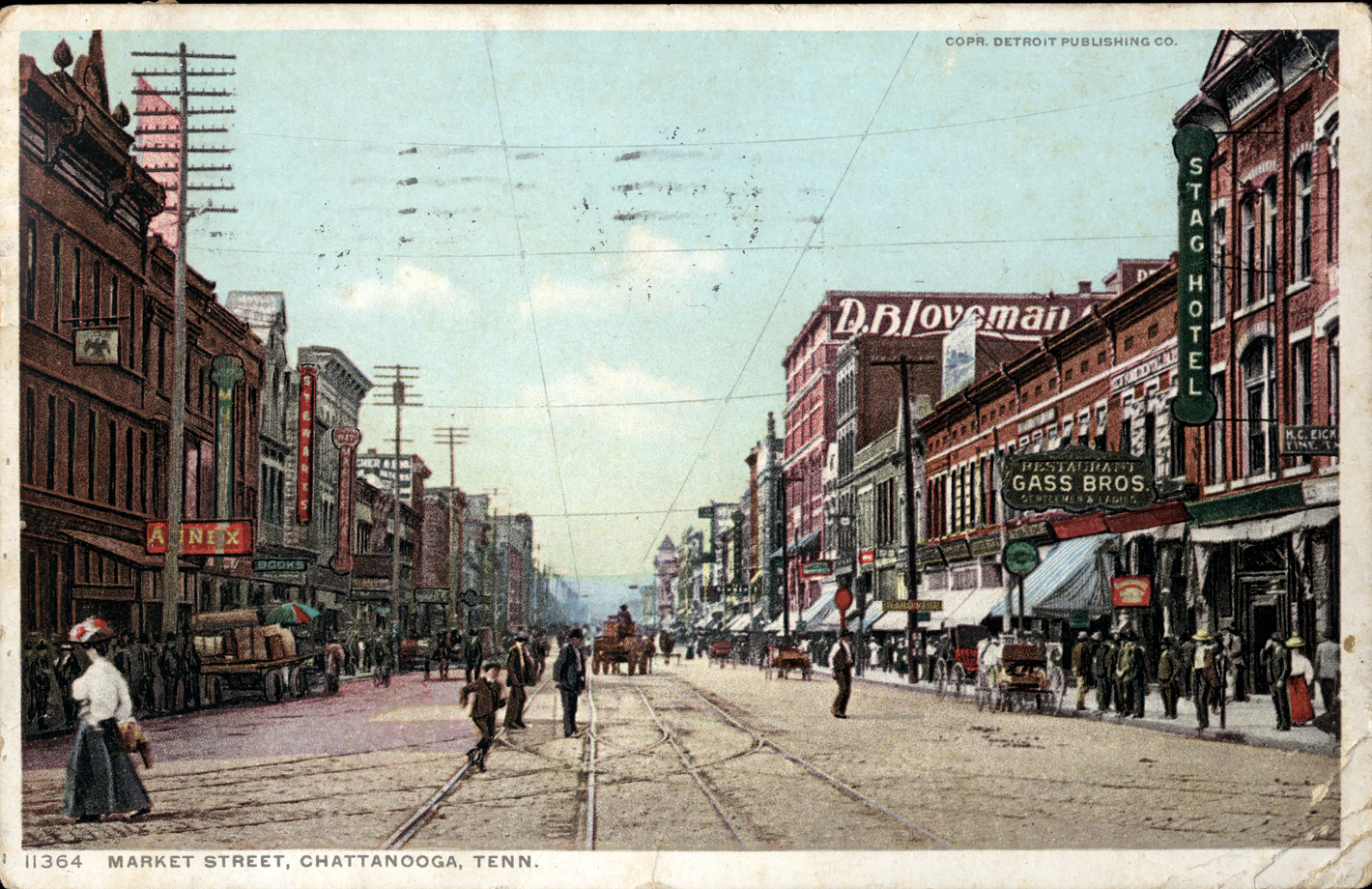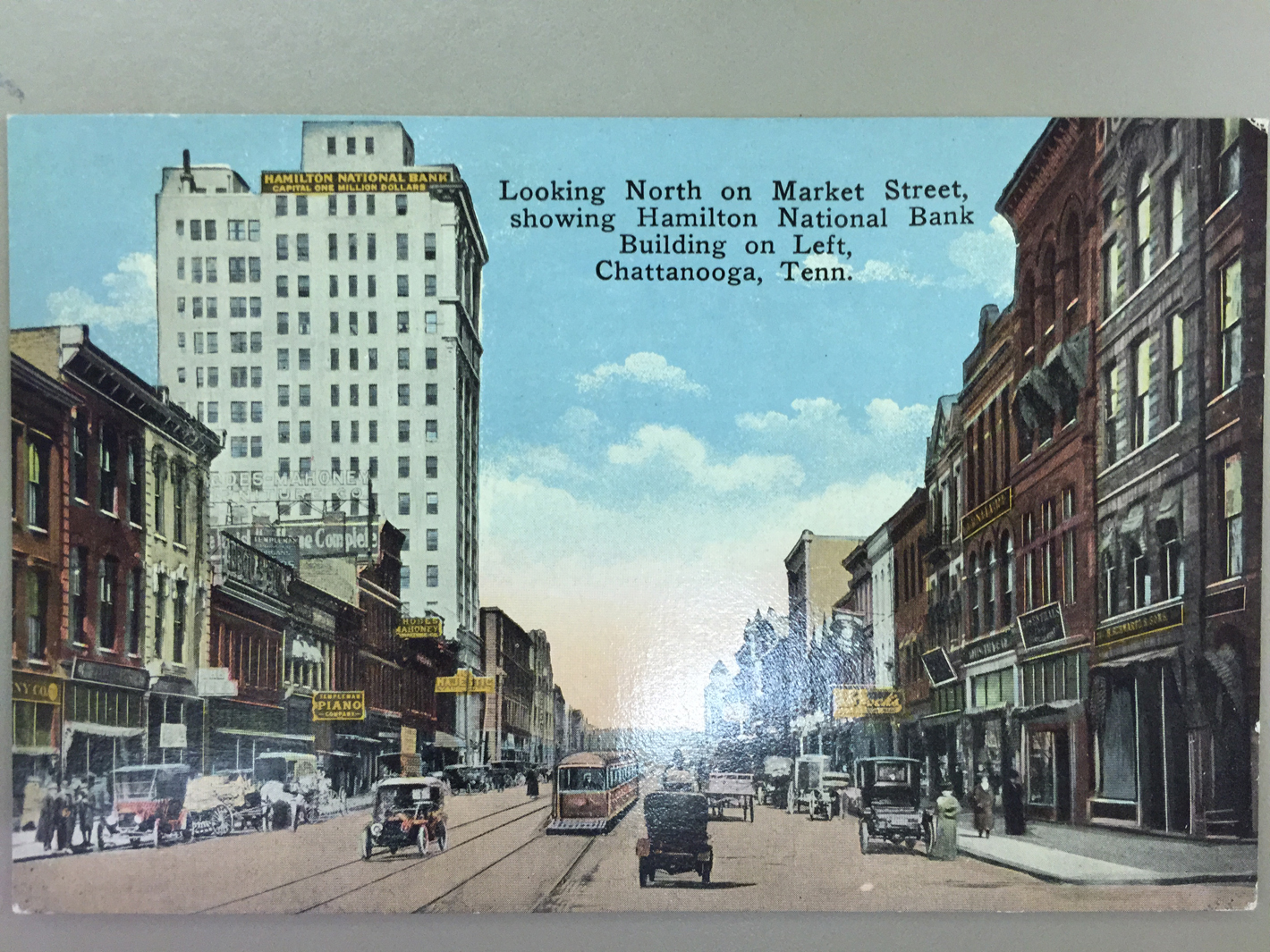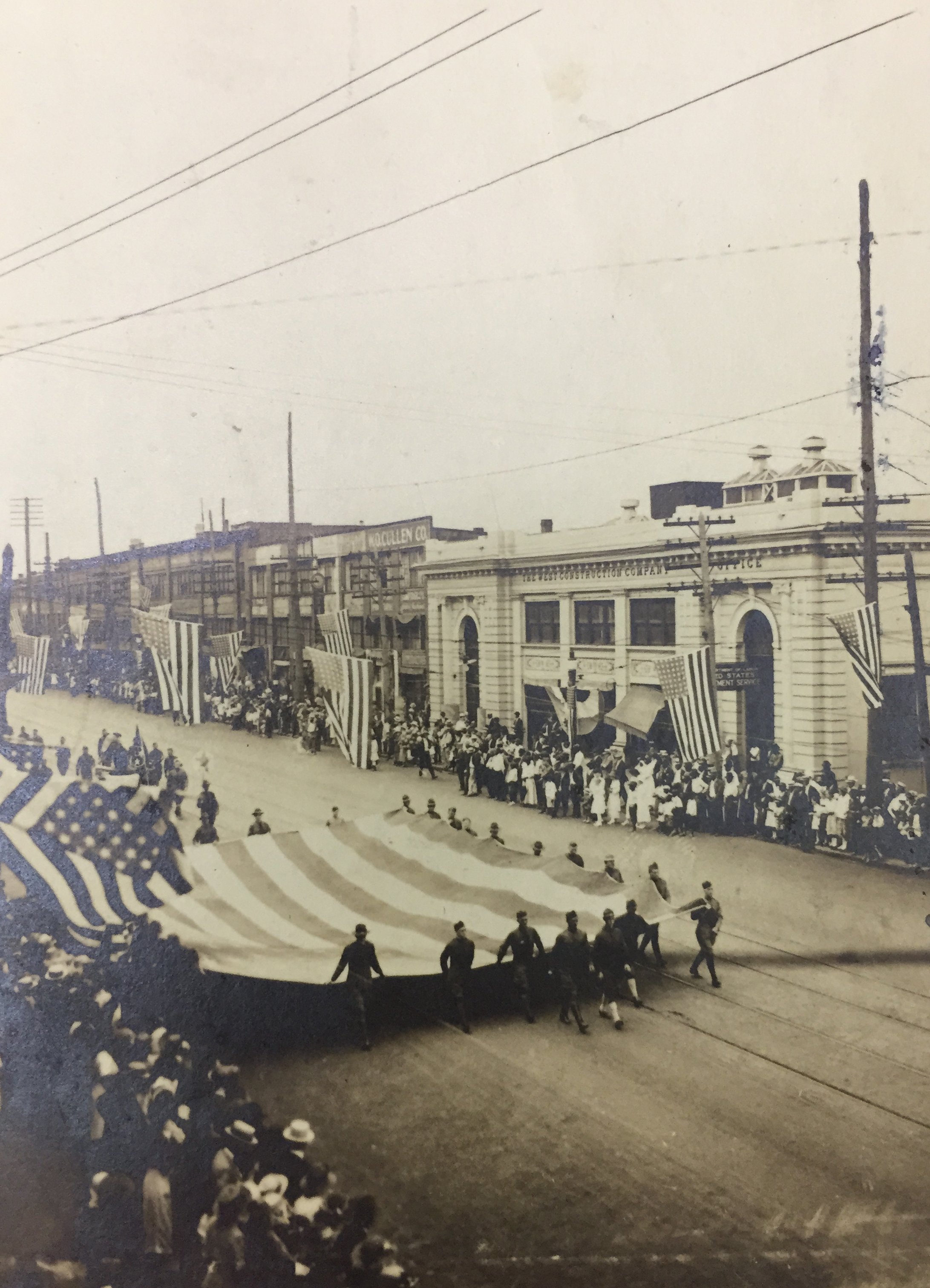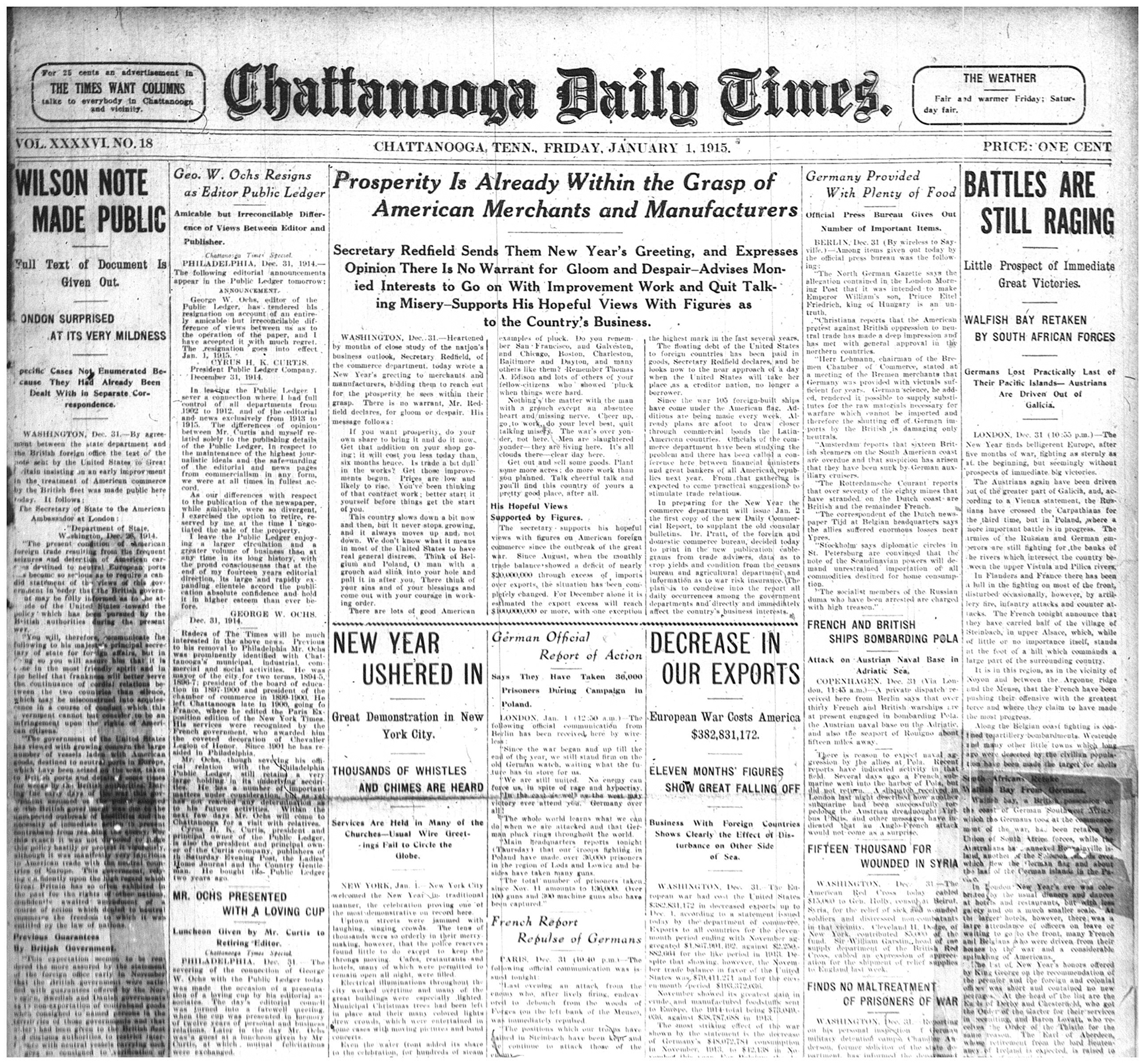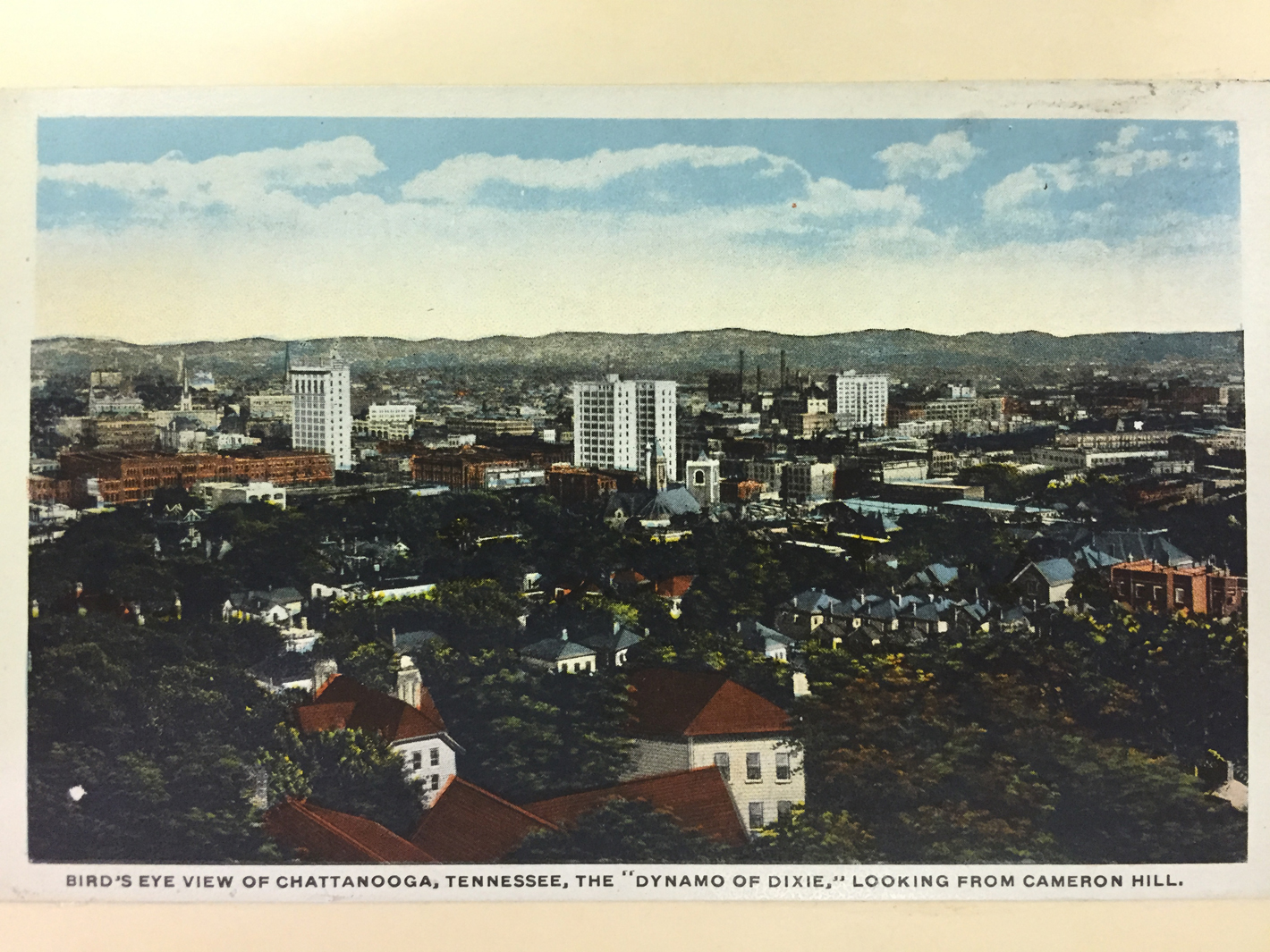At first blush, the lives of Chattanoogans 100 years ago were strikingly different to 21st-century residents of the Scenic City.
In the opening days of 1915, the Market Street Bridge was less than a year into construction and was already being billed as overbudget. Chattanoogans would wait two more years before the completed span was ready to carry buggies and cars -- of the motor and street varieties -- across the Tennessee River.
And that river was still dangerously free-spirited. At 33 and still polio-free, then-U.S. Assistant Secretary of the Navy Franklin D. Roosevelt wouldn't establish the Tennessee Valley Authority for nearly 20 years. Without man's concrete-fisted control of its ebbs and flows, the river was given to sometimes-catastrophic floods, including a legendary one that swamped the city just two years later.
On a single screen, the Alcazar Theatre on Market Street showed silent films -- commonly called "photo plays" -- accompanied by live orchestration. It vied for eyes with the nearby Majestic Theatre, which billed itself as "devoted to clean vaudeville."
Mules and horses were a common sight on Market Street. The asphalt ribbon of Interstate 24 wouldn't cup the city's southern edge for another half century, and the Chattanooga Coca-Cola Bottling Co. had only been capping bubbly at its downtown plant for 15 years.
Copies of the Chattanooga Times cost 1 cent -- a nickel on Sundays -- and local markets offered opossums for 30 cents a pop. Yes, for eating, not petting.
An optimistic spirit pervaded editorials and reports on Jan. 1. This hopeful spirit was despite increasingly dire reports of fighting in Europe -- known then as the Great War or the World War -- which had dominated the front page for more than five months, even though the United States would not officially enter the conflict until April 1917.
Life was different then, but dig just a little deeper, and a century's worth of differences begin to pale in comparison to just how much has remained strikingly unchanged.
Riding the wave of an industrial boom, Chattanooga in 1915 had become a regional economic center fueled by money brought in by the Coca-Cola bottling plant and the city's position as a railroad hub, says Daryl Black, executive director of the Chattanooga History Center. This increasing industrialization carried with it a set of problems that will seem like century-old echoes of issues still faced by 21st century Chattanoogans.
Chattanooga's population
* Then: 57,800 (per 1920 Census) * Now: 173,400 (per 2013 Census estimates) U.S. population * Then: 92.4 million (per 2010 Census) * Now: 319 million (per U.S. Census Population Clock) Unemployment rate * Then: 9.7 percent * Now: 5.8 percent
"Labor conflict was sharp as organizers from the International Workers of the World worked to give voice to the thousands of factory workers in the city," Black says. "The city's citizens had also begun to speak out about issues of air and water pollution with frequent letters to the editor appearing in the Chattanooga Times decrying the environmental abuses by local factory owners."
Here are some of the issues that were of greatest concern to the citizens of Chattanooga in the first week of 1915.
The War
In 1914, President Woodrow Wilson famously declared America's stance of neutrality towards the European conflict, a policy that delayed America's militaristic involvement for three years. Despite this, Chattanoogans were just as focused on the fighting overseas a century ago as they are on American forces' actions in the Middle East today.
The battles in Europe dominated headlines in the Chattanooga Times in early 1915, with stories related to foreign engagements as well as the war's impact on the domestic economy making up the majority of headlines that filled a near-pictureless front page.
Every day, the paper ran a summation of "Late War News," a report frequently featuring updates on the developing stalemate along the eastern and western fronts in Poland and France, the torpedoing of the British warship RMS Formidable by a German submarine in the English Channel and the failed Turkish invasion of Russia.
Although America later would enter the war on the side of the Allies, British treatment of American vessels in the early days of the conflict rankled many Americans. Like the rest of the country, Chattanoogans were raptly focused on a developing diplomatic crisis between the U.S. and Great Britain regarding the seizure of cargo on American ships traveling through British waters en route to Germany and Austria-Hungary. On Jan. 1, 1915, the paper published the full text of President Woodrow Wilson's letter to the British government on Dec. 26, 1914, in which he condemned what he considered interference in neutral commerce.
Noteworthy events
* Jan. 25: AT&T begins operation of the nation's first transcontinental telephone line, connecting New York and Denver. * Feb. 8: D.W. Griffith's controversial, and critically successful, period film "The Birth of a Nation" debuts. * Feb. 18: Germany begins a naval blockade of Britain, beginning "unrestricted" submarine warfare four days later. * March 3: Creation of the U.S. National Advisory Committee for Aeronautics, the predecessor of NASA. * March 16: Formation of the Federal Trade Commission. * April 22: Germans employ chlorine gas in first militarized use. * May 7: Germans torpedo the British ocean liner RMS Lusitania off the coast of Ireland, killing about 1,200, including 128 Americans. * May 17: National Baptist Convention chartered. * Oct. 23: An estimated 25,000-30,000 women march in New York City demanding the right to vote. * Nov. 16: Coca-Cola patents a new contoured, or "hobble skirt," bottle in an effort to distinguish itself from "copycat" soda brands. * Nov. 25: William Simmons and several others burn a cross atop Stone Mountain outside Atlanta, signaling the reformation of the Ku Klux Klan. * Dec. 4: A re-formed Ku Klux Klan receives its charter from the state of Georgia in Fulton County. * Dec. 10: Ford produces its 1 millionth automobile. Sources: Various Internet sites
Sentiment began to shift against Germany and in favor of the Allies following Germany's proclamation on Feb. 18, 1915 of "unrestricted warfare" in British waters. On May 7, a German U-boat torpedoed the British cruise-liner RMS Lusitania off the coast of Ireland, leading to the death of about 1,200, including 128 Americans. That incident is considered by many historians to be one of the early acts to galvanize domestic support for entering the war, although it still took years before American troops were actually in the fighting.
Health scares
Much like the recent nervousness over today's fixation with the spread of Ebola, Chattanoogans in 1915 were concerned over a developing health crisis from a local outbreak of smallpox.
On Jan. 1, the newspaper reported that nine doctors had been assigned in pairs to canvass suburbs of the city as part of a "universal vaccination campaign" against the disease. Families were required to provide evidence that they had been inoculated and, if they were unable to do so, they would be vaccinated "whether it is the wish of the subject or not," according to a Chattanooga Times report.
Other cities in the region reacted to news of the smallpox outbreak in the Scenic City by limiting access to outsiders. On Jan. 6, the city council of Rome, Ga., passed a resolution establishing a smallpox quarantine against residents traveling there from Chattanooga and Chickamauga, Ga., citing a report from earlier in the month listing 36 cases of the disease in those communities.
Anyone wishing to enter Rome during the quarantine had to provide a certificate signed by the mayor indicating that they haven't been exposed to the disease for 20 days. The resolution also placed "health guards" on trains entering Rome by way of Chattanooga and on highways in the vicinity.
Booze
Following mid-term elections in 1914, offices from the governor to the state assembly were newly occupied in 1915. Just as today, the people of Chattanooga were interested in seeing what shifts would result from this changing of the guards.
One of the dominating discussions of the days was temperance. In stark contrast to the renewed interest in distilling and brewing in Hamilton County today -- and the recent vote to allow wine sales in grocery stores -- public sentiment in 1915 was beginning to shift out of favor with alcohol.
In Tennessee, which had enacted, and later repealed, the nation's first alcohol prohibition in 1838, support was growing for a return to drier days, particularly outside the major cities. In 1909, Tennessee followed the path taken by Georgia two years earlier in passing a statewide ban on the sale or consumption of alcohol. Despite this, enforcement was spotty, and distillers and brewers in many cities, including Chattanooga, continued to operate through the end of 1915. But the tide was turning.
In 1914, Tennessee's newly elected governor, Thomas Clarke Rye, rode into office on a pro-prohibition platform that helped to reunify the fractured Democratic Party. A former state attorney general in the 13th Judicial District, he was described as "a terror to bootleggers and dispensers of whisky" with "a reputation of being a more stringent law enforcer ... than any other attorney general."
Support for enactment of a national prohibition amendment to the Constitution, however, was still spotty and wouldn't be adopted for five more years.
Social change, political scandals
Just like today, the issue of voter fraud was in the political news of 1915. Chattanoogans avidly followed a developing story of a scandal surrounding the election of Democrat Jacob Levine to the state House of Representatives over Republican John McGill. In the first session of the newly formed 59th General Assembly, a special committee voted to recount the ballots in the Hamilton County race.
Levine's victory eventually was upheld, but not before a near-brawl broke out, not between the candidates but their attorneys, James Anderson (Levine) and R.B. Cooke (McGill), according to a Chattanooga Times report on Jan. 5, 1915.
"Hot, ugly words, a near fist-fight and a subsequent apology, with two prominent Chattanooga lawyers as principals, early this evening came near breaking up a meeting of the house legislative committee appointed to investigate the merits and demerits of the Levine-McGill contest from Hamilton County," the report read.
The scandal attracted the attention of incumbent governor Ben Hooper, who pointed to the scandal as representative of a widespread issue with elections across the state.
On Jan. 7, the Times ran Hooper's sprawling message to state Legislators in its entirety. In it, he reiterated the need to address some of the issues he brought up during his tenure at the state capitol, including the need for a workman's compensation law, a law prohibiting lynching, a ban on playing baseball and other games on Sunday and a redrafting of Tennessee's then-40-year-old state constitution.
The governor also issued a ringing endorsement for the national trend in favor of women's suffrage, which wouldn't be adopted nationally until 1920, when Tennessee provided the swing vote needed to ratify the 19th Amendment.
"Certainly we will not be content to see the right of suffrage conferred upon the women of other states and withheld from the women of Tennessee, believing as we do that the women of our state are, in no sense, the inferiors of those in any other state in the republic," he wrote.
Above all, however, Hooper hammered home the need for legislation to curb election fraud, specifically a law to prevent public officials from accepting "gifts, favors or franks" from corporations. His word carried particular heat, describing the ballot box as "the ark of the covenant of American liberty" and issuing a damning criticism of a corrupt election system he described as having "woefully failed in [the] discharge of [its] duty."
"In our own state, both Republicans and Democrats in city, county and state elections have been guilty of the bribery of electors. All parties have been guilty and everybody knows it," Hooper wrote. "Republican and democratic primary elections have both been rotten alike."
Contact Casey Phillips at cphillips@timesfreepress.com or 423-757-6205. Follow him on Twitter at @PhillipsCTFP.
